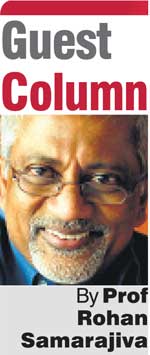Saturday Feb 14, 2026
Saturday Feb 14, 2026
Friday, 20 January 2017 00:06 - - {{hitsCtrl.values.hits}}
The ascendance of the master of “truthful hyperbole” to the US presidency has focused attention on the need for fact checking. The practice of persons in authority uttering falsehoods in public is nothing new to Sri Lanka.
As recently as last month, our former President was reported in Sinhala newspapers as saying that the Hambantota Port and Mattala Airport made profits under his Government.These lies went unchallenged other than in social media.
The widely-publicised on-camera refutation by a journalist of a lie uttered by Bandula Gunawardene, MP, indicates that fact checking may be catching on in Sri Lanka as well.The journalist’s action was highly commendable, but we need a systemic solution for television, which is still the most popular source of news.
Almost 12 years ago, when I still used to watch talk shows, I proposed a solution (quoted verbatim below):
nConduct intensive training courses for young journalists on the use of the internet for political, economic and investigative journalism. The resources for this kind of training are easy to obtain.
nAssign a young journalist the task of preparing an internet segment of 5-10 minutes on the topic of the day for that station’s political talk show. If the segment is longer, run it for the moderator and the participants while they are preparing for the show, perhaps even in the make-up room. Show an edited version at the beginning of the show and possibly at several other junctures in the program. The purpose here is framing the issues and introducing some facts into the discourse.
nWhile the show is going on, have that same journalist/researcher do real-time searches on the issues being brought up in the show. As possible, as relevant, feed the results to the moderator. In a more advanced version, these findings can be shown on a screen that can be seen by the audience. In the West, forms of this are common in media and other settings, as anyone who googles the terms can easily ascertain. The “researcher” is humorously described as a “googling monkey” to signify the simplicity of the task usually performed using the most popular search engine, Google. The journalist’s work should not end with the end of the show; he/she should continue on what now becomes a verification of the statements made by the politicians on the show.
nInstead of the current, somewhat peculiar practice of showing excerpts of talk shows on the news, consider the practice of showing the results of internet-based verification exercises on the news or at the start of the subsequent talk show.
Some form of the above solution would stanch the damage being caused to our body politic by politicians and pundits who pollute public discourse with fake facts.
But these are symptoms.The causes are deeper and more difficult to address.It appears that even senior Sri Lankan academics don’t let facts get in the way of the ideological conclusions they are peddling at the moment.
A Professor from the country’s oldest Department of Mass Communication was asked to make some comments from the floor at a recent panel discussion I participated in.I was shocked to hear him say that the country needed an industrialisation policy because we were importing vehicles that needed tyres manufactured abroad while we still exported raw rubber.
He appeared to be unaware that most of Sri Lanka’s rubber has been exported in value-added form as gloves, tyres, etc. for several decades and that their total value exceeded $ 1.7 billion in 2014.He was ignorant of the facts that Sri Lanka is the world’s leader in solid rubber tyres and actually imports rubber to meet the demand for the tyre factory.This was just one of the misstatements the Professor made.
Why would such egregious errors be made?Was it because the main point the Professor was making about the need for promotion of domestic manufacturing overrode the need to support it with actual facts?That ideology trumped truth?Or was it that the Professor had not bothered to refresh his knowledge from what he heard while still in school in the 1970s?
When persons in authority in our official knowledge-production system pay scant regard to facts, what hope do we have in shifting public discourse to a truth-based plane?Has it become necessary to hire fact checkers for university professors too?Or is it time to rethink the credibility of our universities as well as of the people our universities appoint to professorships?